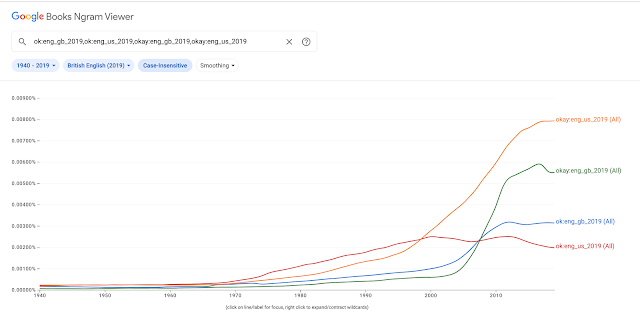See here for the UK-to-US WotY post.
Time for the 2023 US-to-UK Word of the Year. Before people complain that this word has been in British English too long for it to count as a word of 2023, let me remind you of the criteria for SbaCL WotYs:
- Good candidates for SbaCL WotY are expressions that have lived a good life on one side of the Atlantic but for some reason have made a splash on the other side of the Atlantic this year.
- Words coined this year are not really in the running. If they moved from one place to another that quickly, then it's hard to say that they're really "Americanisms" or "Britishisms". They're probably just "internetisms". The one situation in which I could see a newly minted word working as a transatlantic WotY would be if the word/expression referenced something very American/British but was nevertheless taken on in the other country.
- When I say word of the year, I more technically mean lexical item of the year, which is to say, there can be spaces in nominations.
This word did make something of a splash in the British news this year. Here's a tweet from the Daily Mail:
And what was that American word? *fanfare* The 2023 US-to-UK Word of the Year is
OK!
(Also spelled
okay, but we'll get to that!)
Though it has appeared in BrE since at least the late 19th century (originating in AmE earlier in that century),
OK took a while to make its way into everyday speech in the UK. (Click on images to enlarge them.) Here's its trajectory in books (via
Google Books Ngram Viewer).
OK is underrepresented in earlier years in this graph because it was spelled/spelt O.K. with (BrE) full stops/(AmE) periods until and into the 20th century. As far as I know, there's no way to search for a word with that punctuation in it in Google Ngram Viewer, so I'm a bit stuck in showing more of the historical picture.
One of American English's great observers/collectors/analysts,
Allan Walker Read put significant effort into the study of
OK, tracing its origins to a humorous spelling of
all correct. Then people forgot about the joke and it went on to become "the English language's most successful export" according to this
Merriam-Webster post, about a book by another late, great American English linguist,
Allan Metcalf, relating Read's research.
Getting back to the UK news in 2023, here's the headline of the Daily Mail's story:
 |
Dailymail.co.uk headline.
Not linking to them because they don't need the traffic
|
[I]n American English, right conveys the speaker's knowing stance and, in certain environments, the speaker's claim of primary knowledge. In contrast, in British English, right registers provided information as previously unknown, informative, and relevant to the current speaker's ongoing project.
[...]
[S]ome UK usages of right—such as registering of potentially consequential information and projecting a transition—are quite similar to US okay in comparable positions [...]. This suggests a possibility that, in US English, okay took over some of the right usages and/or, in UK English, right took over some of the okay usages."
Their research was inspired by this interaction between BrE-speaking "AB" and AmE speaker "GA":
So, essentially, the British use of right in that context leads GA to think that AB is confirming (rather than acknowledging receipt of) the information. If AB had said OK, then GA would have understood it as acknowledgement rather than confirmation.
Even though the researchers note differences in usage between BrE and AmE okay (though keep in mind that their research is about right), it seems like a fitting US-to-UK WotY because (in whichever usages), it's used more than ever in the UK. Here it is in the British section of the News on the Web corpus, where it shows OK and okay climbing in the last couple of years.
Something to notice about the spelling is that in the news corpus, the OK spelling outnumbers the okay spelling, but in the books okay outnumbers OK. I think this tells us something about spelling style in different kinds of publications. I checked whether it also told us something about adjective (an okay/OK word) versus interjection use (OK! Okay!), but did not find a great difference between the spellings in the different uses.
Since this was a year of warning Britons against it, OK is the 2023 Separated by a Common Language US-to-UK Word of the Year!



























